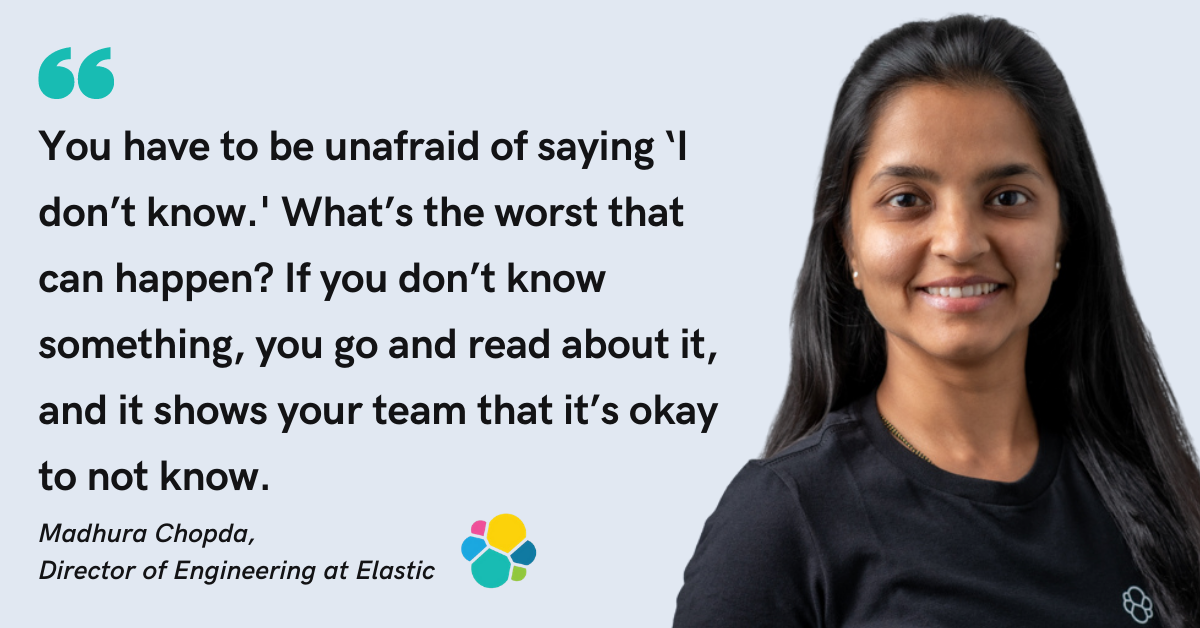Madhura Chopda is a people person.
She always has been.
Give her a complicated cross-departmental problem to wrangle and she'll jump in with two feet, eager to find a way to bring people together. "I like being with people, working with them, resolving conflicts," she says. "Talking to people is what I like to do the most at work." In her current role as the Director of Engineering for search company Elastic, she does a lot of that on a daily basis.
Madhura took the role at Elastic after 12 years at software company ArcSight, during which she made the transition from being an individual contributor to managing others. She started out as the team lead on a tiny team of two, and as that team grew larger and larger, she raised her hand to lead it and eventually grew into being that company's Engineering Manager.
Throughout her career, she's coached hundreds of engineers on their professional development and career plans, including walking them through the age-old question of whether to lean into their technical background to become an individually-contributing subject matter expert and technology leader, or to grow into leadership and become a manager of others.
She always asks them one question: "What are the kinds of problems you like to solve?"
"Is it, 'Why is my ReactJS code not performing up to the mark?' or is it, 'Why is this cross-team item not getting done?'" she asks. "Over time, when you answer that question and have a consistent answer, you know whether you like to solve the soft-skill problems or the technical ones."
Not that it's ever so black and white, adds Madhura. As a technical manager, the majority of her energy might go into unsticking her engineers and making sure they have what they need to succeed, but her day-to-day isn't divorced from technical matters. We sat down with Madhura to better understand how she maintains her technical skills as a leader, what's been key to her success, and why Elastic was the right next step for her.
Finding people passionate about technology—and one another
Over the course of Madhura's career, she realized that there's a particular kind of engineer she really gets along well with: the one who is deeply passionate about their work. It was one of her criteria for joining a new role, and one that Elastic performed very well on.
"I wanted to see passion in the company I'd be joining. When I was interviewing at Elastic, people weren't afraid of talking about what does and doesn't work. Here, if we want to put a text box on the left or the right, there's a very passionate discussion that happens about it!" she says. "I think that ultimately results in a very good UX product."
Along with that passion, says Madhura, she's also found Elastic to be a place that encourages generosity and belonging. "I'm not afraid to say 'I don't know' here. People are very patient and empathetic," she says. "And I've been amazed at how much attention is paid to social issues."
Defining good management
Madhura sees her role as a manager of others to have three main components.
First, she seeks to unlock each individual and enable them to do what they do best. "I try not to barge into technical issues, actually. Engineers are more than capable of solving technical problems. Even rocket science has been solved," says Madhura, smiling. "I try to cater to the emotional part of things." That includes helping her employees define their professional goals and enabling them to succeed, as well as unblocking issues around communication and resourcing.
Second, she works to make sure her team understands how their work contributes to the company's overall mission. "It's only fair that I give them a connection with the company's strategy and why we are doing what we are doing," she says. "An engineer feels very comfortable if he, she, or they know that what they're doing is actually contributing to the success of the company."
Third, she makes sure that the company's mission and strategy continues to evolve and that its engineering team is doing the best it can to support that strategy. "I'm not just in planning or strategy meetings," she says. "I go to design meetings, UI meetings, UX meetings. It's my responsibility to look at the bigger picture."
Keeping up with tech
Though Madhura loves technology, she knows that her management responsibilities don't require her to be as well-versed in it as she was as a full-time engineer. To keep up to date on what matters, she splits technology into two buckets.
The first bucket is the technology that her team uses on a day-to-day basis. To stay current with that set of programming languages and concepts, she has conversations about what she reads with her technical leads. "It gives them an opportunity to think, 'Oh, here's something my manager doesn't know and is willing to learn from me,'" she says.
The second bucket contains everything else. To stay abreast of other new developments in the world of tech that don't immediately impact her team's work, she watches videos, has dinnertime conversations with her husband, who also works in tech, and shares her findings with her peers.
4 tips for managing an engineering team
Madhura's entire management approach, from setting and executing strategies, to centering the experiences of her engineers, to keeping her technical problem-solving skills sharp, is one worthy of emulation. She's distilled her best advice for managing engineers as follows:
1. Think in terms of expertise, not hierarchy. "I don't look at being a manager as a hierarchically higher role. You are just doing a different job than any other person. I am an expert in XYZ area, and the engineers are experts in PQR. So we both have our own expertise," she explains. "This helps me build a good relationship with them."
2. Own what you don't know. "You have to be unafraid of saying 'I don't know,'" says Madhura. "What's the worst that can happen? If you don't know something, you go and read about it, and it shows your team that it's okay to not know."
3. Be an empathetic listener. "In one-on-ones, you should be listening more than you're talking," she says. "And don't ask 'How are you?' That question isn't going to give you the right answer. It's just going to give you the answer you want to hear." Instead, she suggests that managers "respect the pauses," or learn to listen to the subtext behind what an employee is saying. "Try to read their body language and sense if they're really stressed. You don't [always] need to know the reason behind the stress."
4. Model the behavior you want to see. This point is related to all of the advice above, but it's especially important during the pandemic, says Madhura. She makes a point to block off time on her calendar to spend with her kids and encourages her team to take the time they need for their lives outside of work. "It's okay to say that [you're unavailable because you're with your family]," she says. "Everyone should have the flexibility to say that." She loves that Elastic has two company-wide "shut-it-down days" every month where everyone turns off their laptops. "I think empathetic actions speak more than words," says Madhura.
----
If you're interested in joining Elastic, check out their open roles here.




